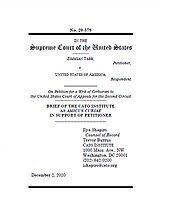The guidelines, like regulations issued by federal agencies, are legally binding. Judges have usually deferred to the commentaries on the guidelines, giving almost authoritative weight to the commission’s interpretations. But that type of deference was altered by the recent Supreme Court opinion in Kisor v. Wilkie. Tabb challenged his sentence in the Second Circuit, arguing that the deference given to the commentaries was unwarranted in the wake of Kisor. While the D.C. Circuit, Sixth Circuit, and now Third Circuit would have agreed with Tabb, the Second Circuit disagreed. Tabb then asked the Second Circuit to rehear his case en banc—where all the judges of the circuit rather than a three-judge panel review his case. Cato supported that petition for rehearing but the court declined. Now Tabb has gone to the Supreme Court to ask them to resolve this circuit split and clarify their actions in Kisor. At issue will be whether the lower courts can keep rigidly deferring to the commentaries without doing their own interpretative work.
In Kisor, the Court paired down the deference that courts give to agencies when they interpret their own regulations. Deference to the Sentencing Commission’s commentaries is exactly that kind of deference to agency self-interpretation which must be similarly restricted. Kisor said that courts should look to agency interpretations only if the regulations really are ambiguous. Lower courts, however, including the Second Circuit in this case, have routinely failed to look for ambiguity in the sentencing guidelines before deferring to the commentaries. The guidelines are not ambiguous as to whether prior offenses include conspiracies and attempts—they don’t. That, not the commentaries, should decide the case.
Cato has filed an amicus brief supporting Tabb and encouraging the Supreme Court to take this case. If the Court fails to take this case and the Second Circuit’s decision is upheld, American citizens will continue to spend additional years in prison on the basis of bureaucratic interpretations that are not law. The Supreme Court should take this opportunity to make clear that this kind of excessive deference, which they came out against in Kisor, will be respected by the lower courts.




